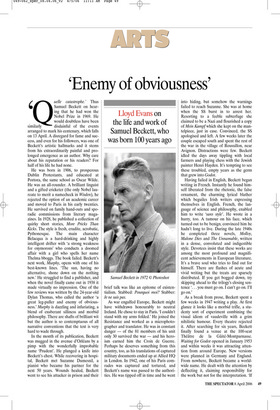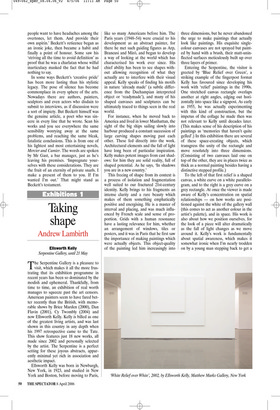‘Enemy of obviousness’
Lloyd Evans on the life and work of Samuel Beckett, who was born 100 years ago
‘Quelle catastrophe.’ Thus Samuel Beckett on hearing that he had won the Nobel Prize in 1969. He would doubtless have been similarly disdainful of the events arranged to mark his centenary, which falls on 13 April. A disregard for fame and success, and even for his followers, was one of Beckett’s artistic hallmarks and it stems from his extraordinarily painful and prolonged emergence as an author. Why care about his reputation or his readers? For half of his life he had none.
He was born in 1906, to prosperous Dublin Protestants, and educated at Portora, the same school as Oscar Wilde. He was an all-rounder. A brilliant linguist and a gifted cricketer (the only Nobel laureate to merit a namecheck in Wisden), he rejected the option of an academic career and moved to Paris in his early twenties. He survived on family hand-outs and sporadic commissions from literary magazines. In 1928, he published a collection of quirky short stories, More Pricks Than Kicks. The style is fresh, erudite, acrobatic, Pythonesque. The main character Belacqua is a hard-drinking and highly intelligent drifter with ‘a strong weakness for oxymorons’ who conducts a doomed affair with a girl who spells her name Thelma bboggs. The book failed. Beckett’s next work, Murphy, opens with one of his best-known lines. ‘The sun, having no alternative, shone down on the nothing new.’ He struggled to find a publisher, and when the novel finally came out in 1938 it made virtually no impression. One of the few reviews was written by the 24-year-old Dylan Thomas, who called the author ‘a great leg-puller and enemy of obviousness.’ Murphy is dazzling and infuriating, a blend of exuberant silliness and morbid philosophy. There are shafts of brilliant wit but the author is so contemptuous of all narrative conventions that the text is very hard to wade through.
In the month of its publication, Beckett was mugged in the avenue d’Orléans by a pimp with the wonderfully improbable name ‘Prudent’. He plunged a knife into Beckett’s chest. While recovering in hospital, Beckett met Suzanne Dumesnil, a pianist who became his partner for the next 50 years. Wounds healed, Beckett went to see his attacker in prison and their brief talk was like an epitome of existentialism. Stabbed: Pourquoi moi? Stabber: Je ne sais pas.
As war engulfed Europe, Beckett might have withdrawn honourably to neutral Ireland. He chose to stay in Paris. ‘I couldn’t stand with my arms folded.’ He joined the Resistance and worked as a microphotographer and translator. He was in constant danger — of the 81 members of his unit only 30 survived the war — and his heroism earned him the Croix de Guerre. Perhaps he deserves something from this country, too, as his translations of captured military documents ended up at Allied HQ in London. In 1942, one of his Paris comrades was captured and tortured, and Beckett’s name was passed to the authorities. He was tipped off in time and he went into hiding, but somehow the warnings failed to reach Suzanne. She was at home when the SS burst in to arrest her. Resorting to a feeble subterfuge she claimed to be a Nazi and flourished a copy of Mein Kampf which she kept on the mantelpiece, just in case. Convinced, the SS apologised and left. A few weeks later the couple escaped south and spent the rest of the war in the village of Roussillon, near Avignon. Distractions were few. Beckett idled the days away tippling with local farmers and playing chess with the Jewish painter Henri Hayden. It’s tempting to see these troubled, empty years as the germ that grew into Godot.
Having failed in English, Beckett began writing in French. Instantly he found himself liberated from the rhetoric, the false ornament, the charming lyrical blather which beguiles Irish writers expressing themselves in English. French, the language of science and philosophy, enabled him to write ‘sans style’. He wrote in a hurry, too. A tumour on his face, which turned out to be benign, convinced him he hadn’t long to live. During the late 1940s he completed three novels, Molloy, Malone Dies and The Unnamable, written in a dense, convoluted and indigestible style. Devotees insist that these works are among the most profound and magnificent achievements in European literature. It’s a brave soul who tries to find out for himself. There are flashes of acute and vivid writing but the treats are sparsely distributed. If you get bogged down, try skipping ahead to the trilogy’s closing sentence ‘... you must go on. I can’t go on. I’ll go on.’ As a break from prose, Beckett spent a few weeks in 1947 writing a play. At first glance it looks like a morbid trifle, a studenty sort of experiment combining the visual idiom of vaudeville with a grim nihilistic humour. Every theatre rejected it. After searching for six years, Beckett finally found a venue at the 100-seat Théâtre de la Gâité-Montparnasse. Waiting for Godot opened in January 1953 and within weeks it was attracting attention from around Europe. New versions were planned in Germany and England. From nowhere, Beckett became a worldwide name. He dealt with the attention by deflecting it, claiming responsibility for the work but not for the interpretation. ‘If people want to have headaches among the overtones, let them. And provide their own aspirin.’ Beckett’s reticence began as an ironic joke, then became a habit and finally a point of honour. Some saw his ‘striving all the time to avoid definition’ as proof that he was a charlatan whose wilful inarticulacy masked the fact that he had nothing to say.
In some ways Beckett’s ‘creative pride’ has been more lasting than his stylistic legacy. The pose of silence has become commonplace in every sphere of the arts. Nowadays there are authors, painters, sculptors and even actors who disdain to submit to interviews, as if discussion were a sort of impiety. But Beckett himself was the genuine article, a poet who was sincere in every line that he wrote. Scan his works and you see everywhere the same sensibility worrying away at the same problems, and reaching the same bleak, fatalistic conclusions. This is from one of his lightest and most entertaining novels, Mercier and Camier. The words are spoken by Mr Gast, a bar manager, just as he’s leaving his premises. ‘Impregnate yourselves with these considerations. They are the fruit of an eternity of private snarls. I make a present of them to you. If I’m wanted I’m out.’ That might stand as Beckett’s testament.











































































 Previous page
Previous page